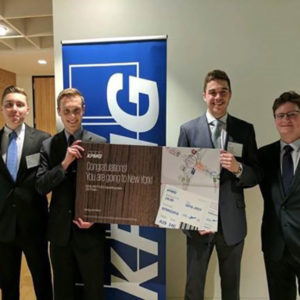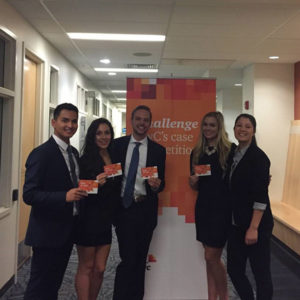Case competitions give College of Business students a chance to enhance and demonstrate their skills in analyzing rigorous business challenges. The competitions prepare them to provide sound consultation when they begin their careers. Together, team members review issues provided by the competitions, then have to consider business laws, global perspectives, potential outcomes, and many other factors to determine what core problems are at stake — and the best way to resolve those problems. Recently, CSU teams competed in – and won – the latest rounds in two major competitions.

CSU team wins KICC semi-finals
During the fall semester, CSU hosted the Campus Round of the KPMG International Case Competition (KICC). With the support of Jenna Bicego, Campus Development Manager at KPMG, the winning team, called Mile High Assets, advanced to represent CSU against five other teams from across the country in the KICC Regional in San Francisco on January 12 – 13. The team was victorious and will now move on to the national finals in New York City on February 23 – 24, with winners from that competition advancing to international finals in Lisbon, Portugal.
The campus case
KICC teams review a business case, analyze it, and present solutions to judges (members of KPMG leadership), who decide on the winners. Judging criteria include: balanced participation between team members, effective and accurate analysis, realistic resolution recommendations, and ability to defend ideas during a question and answer session. At CSU, students had to present ideas to a major hotel group on where they should expand their Dubai-based business and brand – both within that city, and globally. “So they had to think through different cultural factors, and where to go next based on historical background about the company, and more,” said Bicego.
Expanding business and presentation skills
The competition is designed to instill key skill sets for on-the-job performance. As Bicego says, “I was in KPMG’s international tax practice before switching into campus recruiting, and every day, you’re faced with a client who has a question for which you’re not necessarily prepared. You have to quickly interpret what they are asking, analyze your knowledge of the client, consider all factors and information, and articulate a meaningful answer to instill confidence.” While at least one member of each team must be an accounting major, students from a variety of academic disciplines also participate.
Likewise, students from all grade levels are eligible for the KICC competition, though Bicego says the focus is on sophomores and juniors. “We know they’re going to go through the recruiting process, as well as into classes that rely heavily on these skills,” she says. “Getting the participants in front of KPMG leaders prepares them to walk into a career fair with more confidence. The KICC experience helps ensure they are memorable and make a good impression.”

From left to right, Manuelito Santistevan, Melody Wells, Kaleb Ast, Elizabeth Sautel, and
Jordan Reynolds.
PwC Competition
The PwC Case Competition also recently took place at CSU. Sammy Siegal, Rockies Market Campus Talent Acquisition Manager at PwC, oversaw the competition. He says, “There are no right or wrong answers; it’s totally open-ended. But it’s a test of their critical thinking skills, as well as their creativity, how they work together, their public speaking skills, and how they deliver their ideas to the judges.”
PwC leaders, who help make such high-level business decisions on a regular basis, make up the judging panel. Together, they listen to the teams’ presentations, then respond with hard-hitting questions to help students dig even deeper. In this way, students are pushed to address any loopholes in their solutions — which, Siegal notes, is a very practical test to ensure that they understand every angle of the business scenario they’re working with.
Teams for the PwC competition consist of about five students each, and each team has a CSU faculty advisor as well as a PwC advisor. “When I’m advising students,” says Siegel, “I let them know that the judges will try to throw them off their game, just like a client would. If their presentation is abstract, the judges will find holes.”
In the end, Siegal says, the competition gives students an opportunity to work together in a way that allows them to learn very real, practical skills in a way that extends their knowledge beyond the classroom. Plus, it offers opportunities for students to meet with PwC representatives, and make connections toward potential future career paths.